Effective Rat Repellents: Proven Strategies For A Rodent-Free Home
At Apex Pest Control, we understand the importance of keeping your home rodent-free. This comprehensive guide explores various rat repellent methods, helping you protect your property and family from these persistent pests.
Explore our comprehensive guide on Rat Prevention Methods, featuring proven strategies and essential tips to keep your home safe and rodent-free.
The Problem with Rats
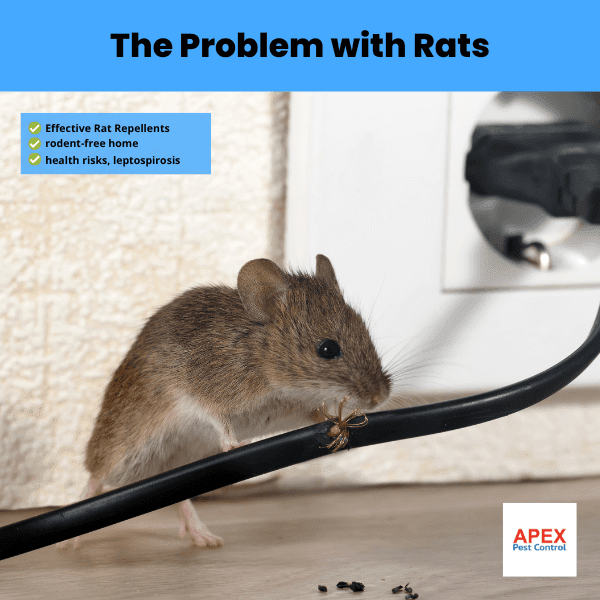
Health Risks Associated with Rats
Rats pose significant health risks to humans. These rodents can transmit various zoonotic diseases, including:
- Leptospirosis
- Hantavirus Pulmonary Syndrome (HPS)
- Salmonellosis
- Rat-Bite Fever
- Plague
Even indirect contact with these pests can lead to serious health complications. Rat urine and droppings can contaminate surfaces and food, increasing the risk of disease transmission.
Damage Caused by Rats to Property
Rats cause substantial property damage due to their gnawing habits. They often chew on:
- Electrical wiring (potentially causing fire hazards)
- Insulation materials
- Wooden structures
- Pipes and plumbing
Over time, this rodent activity can result in costly repairs for homeowners and businesses alike.
The Need for Rat Repellents

Why Rat Repellents Are Necessary
Given the health risks and potential property damage caused by rats, implementing effective control measures is crucial. Rat repellents serve as a proactive approach to keeping these rodents at bay without necessarily resorting to lethal methods.
Benefits of Using Rat Repellents
Unlike traps or poisons, which require dealing with dead animals, repellents work by deterring rats from your premises, resulting in:
- Less mess and cleanup
- Reduced risk of secondary poisoning to pets and wildlife
- Peace of mind knowing your home is protected
- Environmentally friendly pest management
Types of Rat Repellents
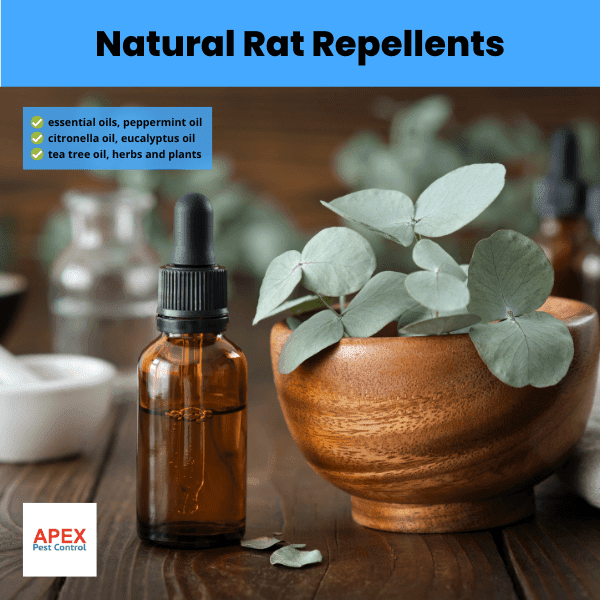
Natural Rat Repellents
Essential Oils
Certain essential oils act as natural rat deterrents due to their intense smell, which irritates rodents’ sensitive nasal cavities. Effective options include:
- Peppermint oil
- Citronella oil
- Eucalyptus oil
- Tea tree oil
Herbs and Plants
Plants with strong odours can deter rats and other pests. Consider planting or using:
- Mint
- Lavender
- Rosemary
- Sage
Predator Urine
The scent of predator urine can create a fear response in rats, deterring them from the area. Options include:
- Fox urine
- Coyote urine
- Cat urine
Commercially Available Products

Ultrasonic Devices
These devices emit high-frequency sounds unpleasant to rats, causing them to avoid areas where the device is placed. Features to look for include:
- Adjustable frequency settings
- Coverage area appropriate for your space
- Battery backup for continuous protection
Chemical Sprays
Commercially available sprays contain chemicals that either irritate or repel rats. When using these products:
- Follow manufacturer instructions carefully
- Reapply as directed for maximum effectiveness
- Use in conjunction with other prevention methods
Capsaicin-Based Repellents
Derived from chilli peppers, capsaicin is a natural irritant to rodents. These repellents can be highly effective when applied to:
- Entry points
- Known rat pathways
- Areas of frequent rodent activity
Homemade Rat Repellents
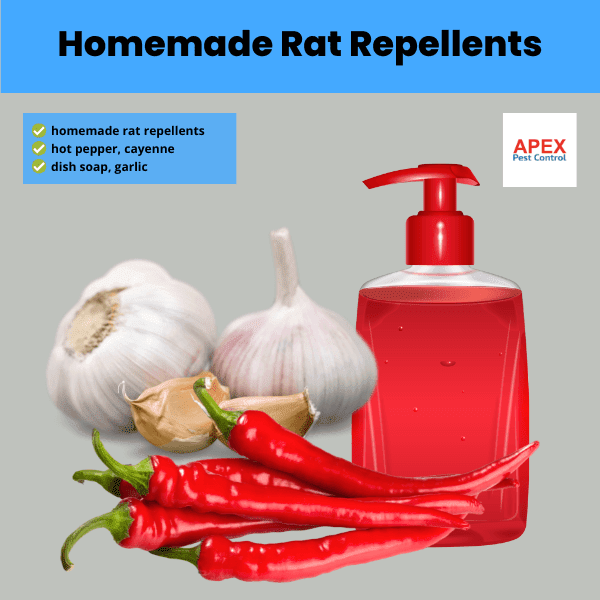
Recipes and Methods
A common homemade repellent involves mixing:
- Hot pepper (cayenne or crushed red pepper)
- Garlic
- Dish soap
- Water
Spray this mixture around rat-infested areas to deter their activity due to its strong odour and irritation upon contact.
Effectiveness
While not as potent as commercial products, homemade repellents provide an affordable and readily available solution, especially for those wary of using synthetic chemicals in their homes.
How to Use Rat Repellents
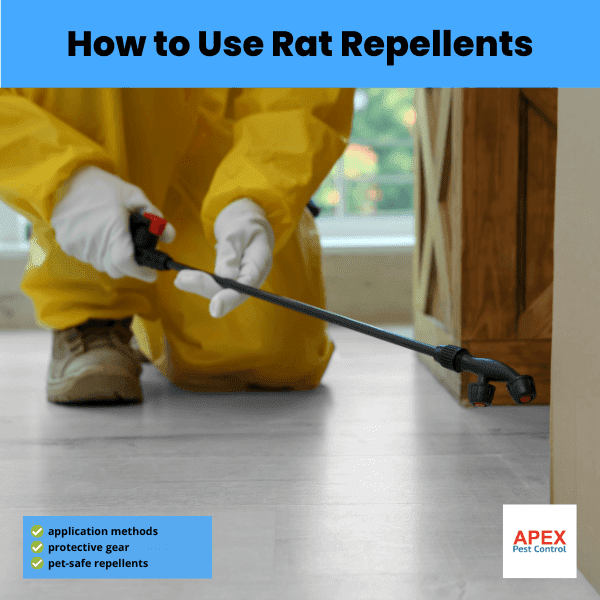
Correct Application of Natural Repellents
For natural remedies like essential oils or herbs:
- Identify high-risk areas (entry points, food storage, etc.)
- Apply oils or place herbs strategically in these locations
- Refresh scents regularly, as they fade over time
- Combine with other prevention methods for best results
Safe Use of Commercial Repellents
When using store-bought repellents:
- Read and follow all instructions on the packaging
- Use only recommended quantities
- Keep products out of reach of children and pets
- Reapply according to manufacturer guidelines
Tips for Using Homemade Remedies
To maximise the effectiveness of DIY solutions:
- Apply consistently and frequently
- Combine multiple natural ingredients for a stronger effect
- Use in conjunction with proper sanitation and exclusion methods
- Monitor results and adjust recipe as needed
Precautions When Using Rat Repellents
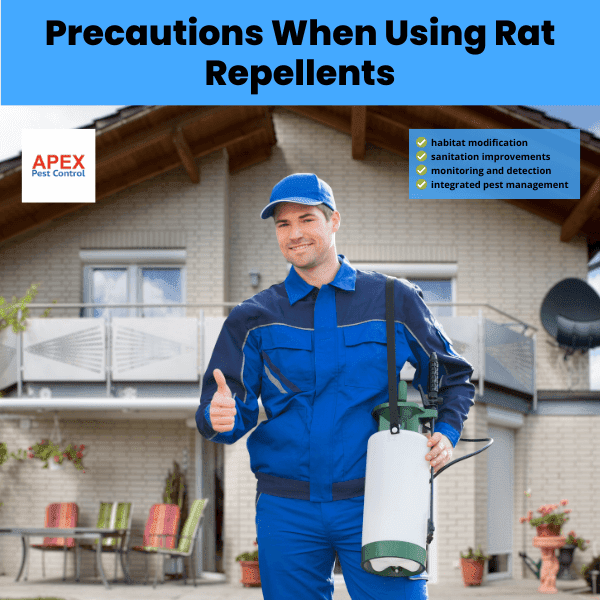
Safety Measures for Humans
When handling any rat repellent:
- Wear protective gear (gloves, masks) when applying
- Avoid direct skin contact with chemical repellents
- Store all products in a secure, dry location
- Wash hands thoroughly after application
Safety Measures for Pets
To protect your furry friends:
- Choose pet-safe repellents when possible
- Keep pets away from treated areas until dry
- Monitor pets for any adverse reactions
- Consult with a veterinarian before use if you have concerns
Alternatives to Rat Repellents

Integrated Pest Management (IPM)
IPM combines multiple strategies for comprehensive rodent control:
- Habitat modification
- Exclusion techniques
- Sanitation improvements
- Monitoring and early detection
- Use of repellents and other control methods as needed
Professional Pest Control Services
For severe infestations or ongoing issues, consider Apex Pest Control’s professional services:
- Thorough property inspection
- Customised treatment plans
- Use of advanced, eco-friendly control methods
- Follow-up visits and maintenance plans
The Effectiveness of Rat Repellents

Factors Affecting Effectiveness
The success of rat repellents depends on:
- Proper application and consistency of use
- Type and severity of infestation
- Environmental factors (food availability, shelter, etc.)
- Combination with other prevention methods
How to Increase Effectiveness
To maximise the impact of your rat repellent strategy:
- Implement a multi-faceted approach (repellents + exclusion + sanitation)
- Rotate different types of repellents to prevent habituation
- Address underlying attractants (food sources, harborage)
- Maintain vigilance and adjust methods as needed
Emerging Trends in Rat Repellent Technology
Botanical-Based Repellents
Research is ongoing into plant-derived compounds that effectively repel rats while being environmentally friendly. Some promising options include:
- Neem oil extracts
- Cedar wood oil
- Geraniol (derived from geraniums)
Smart Repellent Systems
Advancements in technology are leading to more sophisticated repellent solutions:
- IoT-enabled devices that can be monitored and controlled via smartphone apps
- Systems that combine multiple repellent methods (ultrasonic + scent + light)
- AI-powered devices that learn and adapt to rat behaviour patterns
Conclusion: Choosing the Right Rat Repellent
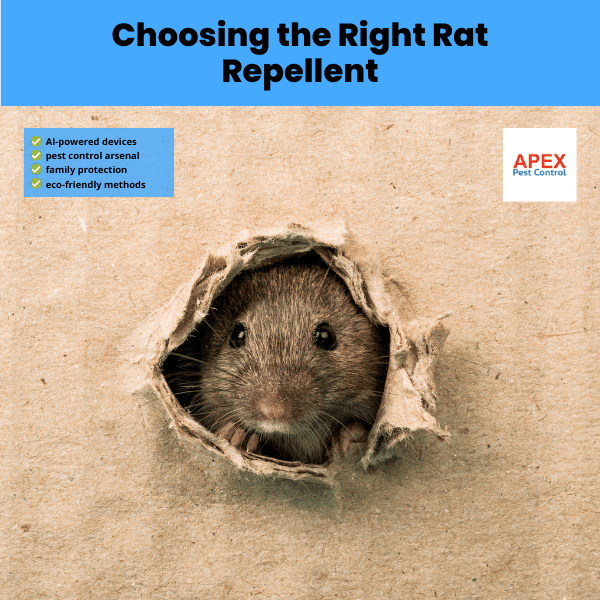
Considerations When Choosing a Rat Repellent
When selecting a rat repellent strategy, consider:
- The severity of your rat problem
- Your budget and time constraints
- The presence of children or pets in the home
- Environmental concerns and preferences for natural solutions
Final Thoughts on the Importance of Managing Rat Problems
At Apex Pest Control, we emphasise the importance of a proactive approach to rat management. By combining effective repellents with comprehensive prevention strategies, you can create a safer, healthier environment for your family and property.
Remember, while repellents can be a valuable tool in your pest control arsenal, they work best as part of an integrated approach. For persistent or severe rat problems, don’t hesitate to contact Apex Pest Control for professional assistance. Our expert team is ready to provide tailored solutions to keep your home rodent-free.
FAQs
What is the most effective natural rat repellent?
Peppermint oil is often considered one of the most effective natural rat repellents due to its strong scent that rats find unpleasant.
How long do ultrasonic rat repellents last?
Most ultrasonic devices can last for several years with proper maintenance, but their effectiveness may diminish over time as rats can become accustomed to the sound.
Are rat repellents safe to use around children and pets?
Many natural and some commercial repellents are safe for use around children and pets, but always read labels carefully and keep products out of reach.
Can I make my own rat repellent at home?
Yes, you can create homemade repellents using ingredients like hot peppers, garlic, and essential oils. However, their effectiveness may vary compared to commercial products.
How often should I apply rat repellents?
The frequency of application depends on the type of repellent. Natural scents may need reapplication every few days, while commercial products might last several weeks. Always follow the manufacturer’s instructions.
By understanding and implementing these rat repellent strategies, you can significantly reduce the risk of rat infestations in your home. For professional assistance or more information on our pest control services, contact Apex Pest Control today.

Tony Johnson, Founder & Lead Technician at Apex Pest Control, is a BPCA and NPTA accredited pest management expert with over 35 years’ hands-on experience. Tony specialises in Integrated Pest Management and ensures all services comply with UK pest legislation, including the Wildlife and Countryside Act 1981 and COSHH Regulations 2002. His commitment to continual learning and adapting to industry best practices means clients receive effective, safe solutions for pests affecting homes and businesses across South Yorkshire. Tony’s dedication to professional standards, ethical treatment methods, and local expertise has made him a trusted partner for pest control and prevention.
-
BPCA & NPTA accredited | CHAS certified
-
Committed to UK pest law compliance & safety
-
Focused on effective, ethical pest management for South Yorkshire


